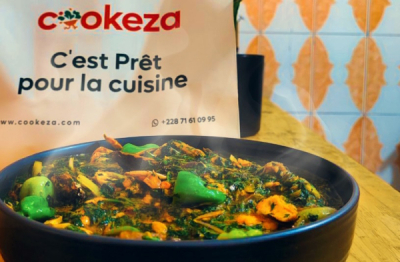- Cookeza, a Togolese foodtech startup founded in 2024, sells ready-to-cook meal kits made from 100% local ingredients.
- The platform partners directly with local farmers to ensure freshness and support the national agri-food value chain.
- The company plans to expand across West Africa and diversify distribution through subscriptions and supermarkets.
Cookeza, a Lomé-based startup, aims to redefine convenience cooking in Togo by offering online ready-to-cook food kits featuring locally sourced ingredients. The company targets busy urban consumers who want quick meals without losing touch with traditional African flavors.
Founded in 2024 by Duphanie Amadou, Cookeza operates an e-commerce platform that sells boxes containing washed, chopped, and seasoned ingredients for authentic African dishes. Customers receive recipe cards and can order delivery to their homes or pick-up points.
“Cookeza was born from a simple observation: modern African families lack time to cook but don’t want to sacrifice quality or forget their culinary roots,” the company states on its website. “We work directly with local producers to ensure freshness and quality while supporting the local economy.”
The platform integrates e-commerce and urban logistics to shorten cooking time. Through its website, users can browse meal kits—such as traditional Togolese recipes—and order online. Each pack includes all necessary ingredients sourced from nearby farmers, ensuring both freshness and traceability.
Cookeza’s model benefits not only consumers but also Togo’s agricultural value chain. By prioritizing local sourcing, the company strengthens ties between food producers and urban markets, offering farmers a steady outlet for their produce.
Although Cookeza has not yet launched a mobile app, customers can order directly via web browsers. The company also offers subscription packages for restaurants, corporate canteens, and households, including a monthly plan priced at CFA40,000 (about $70.70).
With around 20 available recipes, Cookeza plans to expand its offerings and distribution channels. Future goals include partnerships with supermarkets and regional expansion into West Africa.
The startup faces challenges typical of the sector: maintaining quality at scale, optimizing delivery logistics, and competing with fast-food chains and ready-made meal providers. However, its focus on authentic African cuisine and local supply chains could help it secure a strong niche in the growing African foodtech market.
This article was initially published in French by Adoni Conrad Quenum
Adapted in English by Ange Jason Quenum



















